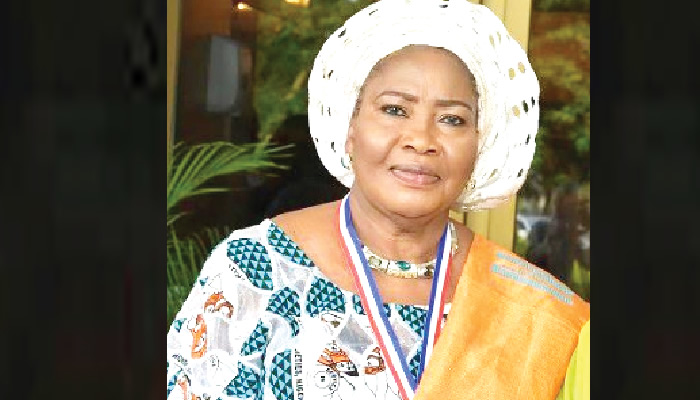
Mrs Gloria Shoda, the President of the Africa Women Council and a former president of the National Council of Women Societies, talks to TOPE OMOGBOLAGUN about women and politics in Nigeria
Recently, there was a report that only about six per cent of women are active in Nigerian politics. Why do you think women don’t really participate in politics?
We have been talking about the low percentage of women participating in politics for a very long time, and there are several reasons why the percentage is so.
First, it is the political will, which is very low in our country. We have not been able to set aside a percentage for women as other countries do. Some African countries have a percentage set aside for women, and it’s compulsory for women to occupy these government offices, especially political offices in their countries.
Furthermore, it is not a level playing field because politics is practised in Nigeria with money and power. There’s a lot of violence in our politics also. It’s the survival of the fittest, and you know, a lot of women are scared of violence. They fear for their children. They fear a lot of things that men might not bother about.
So many things limit women, including our social interaction, culture, religion, and so many other things.
Our culture doesn’t allow women to lead men. They will say, “How can a woman be in charge when men are there?” Some religions also do not allow their women to be at the forefront of politics. So, those are the things preventing women from taking part in partisan politics.
Also, women themselves are enemies because a lot of women are jealous when they see an aspiring, coming-up woman. They start giving her all sorts of names. They become jealous, pull her down, and say, “Is she the only one? Why not me? She must have done this; she must have done one bad thing or another.”
Likewise, you know a lot of women find it difficult to stomach criticism. Even when the husbands have the lever to allow their women to go into politics, the other men sometimes start telling them things like, “Your wife will soon become your boss; if she becomes governor, what will you be called?” These men then grow cold feet and start to withdraw their women from taking part in politics.
In addition to that, a lot of political meetings take place at midnight and other odd hours of the day, and a lot of the political leaders are married, so a lot of men will not allow their wives to be out after midnight because of the kind of names that will be ascribed to them if they are seen with other men at such a late hour. So many things are the reason.
You mentioned that money was part of the reason for the lower participation of women in politics. The APC gave women about a 60 per cent discount for presidential forms but only got one woman to sign up for it. Why is this so?
60 per cent off is still a significant savings. The APC pays N100m for the presidential form. So 60 per cent of 100 million is N60m, and for the average woman in Nigeria, that is a lot. Look at what happened to the only woman who came out in the primaries. She was muzzled. I’m sure she didn’t have enough money to give delegates. Then, she even said it herself: “Women are not ready.” That’s why I mentioned women; we’re our own worst enemies.
I will give an example of what women do even when we go to conferences. Instead of sitting down to listen to conferences, they will go out to buy things and do this and that. Women really have not made themselves ready. While men will be seriously waiting to see the outcome of the programme they came for, women are busy shopping.
So, if you look at it, you will see it. For example, take the woman who came out and said that women are not yet ready. You know, maybe someone just said, “Let’s have one woman; let’s buy her a form; let her just be there to represent women. You know how godfatherism is in Nigeria.
You are saying that poverty is a huge factor?
Poverty is one of the factors; prudence is another on the women’s part. A woman cannot gather money. She has maybe N500m, she cannot take out N100m for something she is not sure she is going to win. Women normally think seriously, and one thing they think about is the future of their children. They don’t gamble, but men can even go to the bank to borrow the money to buy the form.
So, I don’t know what you call it—maybe the women don’t have the boldness to come all out and give all it takes. I will give another example of what’s happening to Natasha. She decided to give it her all, and you know what she’s facing, so that’s the problem. A lot of women don’t want to face that kind of thing. They don’t have the ‘liver’ to face those problems.
As a result, even those with money fled. We have women who have the money; they said, “I would rather have peace than go into this wahala (problem).” So, that’s it.
Recently, the PDP women’s leader lamented about being sidelined, so it appears that some of these women are even fighting head-on in the positions that have been assigned to them. When do you think that Nigerian women will be ready for partisan politics?
I believe we will be ready when women decide to have one voice and assist one another. When a woman recognises the potential in another, she supports and pushes that person to go as far as they can.
Not when many of you are fighting for the same position or, in some instances, dragging some people down or maligning them because they have a position.
It is when we say, “We can identify with this one, and we know that she is good in her locality or community, and we must push her to become this or that.” That is when we would begin to progress
We have Dr Ngozi Okonjo-Iweala, you and others doing well even at the international level. Why are top women like you not getting involved in partisan politics? Could it be for the fear of being dragged into the mud?
It is not really the fear of getting smeared or dragged through the mud; I believe everyone has their own calling. We are not all politically motivated, but if we find someone who is, we can rally behind them. I am not really interested in politics; I prefer to work for an NGO, and I think it’s the same for Aisha. Ngozi is a mixture of politics and governance, and she is doing very well in that space.
There are those who are fighting as hard as Biodun Olujimi; she is working and fighting as hard as they are. Women like this should gather around her and make sure she gets the position she wants.
Many times, people will say, “When she gets there, she will not remember us; it’s not about remembering us; let her get there; let us have it written that a woman is there, a woman is a governor, a president, vice presidents, and all that.”
Let’s also encourage our young women to go into politics and start at the ward level. You build, but everyone wants to begin with the House Assembly, House of Representatives, or Senate.
If they begin from the grass root, they will grow, and if they begin from there, they’d likely develop the thick skin that most politicians develop.
There has been this argument that women should come together and form a political party. Do you think that will work?
No, I don’t think it would work. Some women have tried it in the past, but it didn’t work out. Nigeria doesn’t only consist of women. But we can have a political party that has a higher percentage of women. They could have a case where they agree to a certain percentage of women’s leadership, and even after winning the elections, we can bargain to accommodate women.
What we have right now is that some politicians come and make promises that they are going to look after women, but after they have won the election, they forget about women because men like to look after themselves while women are busy clapping after them.
That is why we would have a female leader relegated to the backyard. Because she represents women, the female leader is supposed to sit alongside the party’s chairman. It’s not only when they need to gather women for rallies that they remember that there is a female leader.
How can we achieve a Nigeria where women support women?
You know it’s a mindset; we have been saying this thing for a very long time, saying women for women, women supporting women, and the rest. When women get to the position where they can gather women, they start trading blame. Women support women when they choose those who can cling to them.
Also, we have very few women who support other women and do it sincerely. Women in positions must begin to deliberately position other women in order for them to also get to the top of the ladder.
Also, we must keep sensitising women about the need to support one another.





